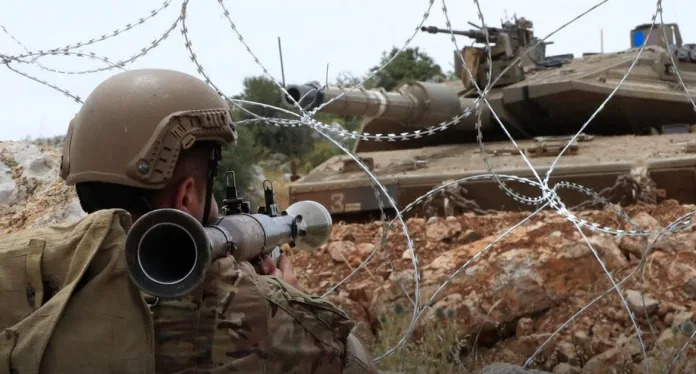Israeli airstrikes claim lives in South Lebanon, prompting Hezbollah’s retaliation with attacks on military sites in Israel amid escalating tensions
In the ongoing Israel-Hamas conflict, tensions reached a critical point with a deadly exchange of fire between Israeli forces and Hezbollah militants. Israeli airstrikes near Tyre in South Lebanon resulted in casualties, including two deaths and several injuries. The incident, which targeted a building between the villages of Janata and Deir Qanun, remains under investigation by the Israeli military.
Hezbollah swiftly responded with a significant escalation, launching rockets and drones at nine Israeli military sites. This retaliatory strike, described as the largest since October, targeted key locations including Israel’s northern command headquarters, an intelligence center, and military barracks. The assault involved the deployment of over 100 rockets and approximately 30 attack drones, marking a dramatic intensification in hostilities along Lebanon’s southern border.
Amidst the military exchanges, efforts to deliver humanitarian aid to Gaza continued. Despite 220 trucks carrying aid entering the Gaza Strip, logistical challenges led to only 70 trucks being collected by UN agencies. This shortfall underscores ongoing difficulties in ensuring effective humanitarian relief amidst the escalating violence.
Internationally, Senator Bernie Sanders endorsed a United Nations report accusing both Israel and Hamas of war crimes and crimes against humanity. Sanders emphasized the need to uphold international humanitarian law and support the findings of organizations like the UN and the International Criminal Court.
Colombia also made headlines by announcing plans to provide medical treatment to Palestinian children injured in the conflict. This initiative marks a significant diplomatic shift for Colombia, which had historically maintained close ties with Israel but has recently distanced itself under President Petro’s administration.
Analysis:
Political Perspective: The escalation between Israel and Hezbollah underscores broader geopolitical tensions in the Middle East. It highlights the challenges of maintaining regional stability amidst longstanding conflicts and geopolitical rivalries. The involvement of international actors like the United Nations and Senator Sanders reflects growing global scrutiny of the conflict’s conduct and its implications for international relations.
Social Perspective: Socially, the conflict exacerbates humanitarian crises and displacements, particularly impacting civilians in Gaza and southern Lebanon. The humanitarian aid shortfall in Gaza demonstrates the urgent need for international support to alleviate suffering and address the humanitarian consequences of prolonged conflict.
Racial Perspective: While the conflict primarily revolves around geopolitical and ideological differences, racial and ethnic identities play a complex role within the broader context of Middle Eastern politics. The targeting of civilian populations and the displacement of Palestinian communities underscores enduring racial tensions and inequalities exacerbated by conflict.
Gender Perspective: Gender dynamics in conflict zones often exacerbate vulnerabilities for women and children, who bear disproportionate impacts of violence and displacement. The provision of medical care to injured Palestinian children by Colombia highlights the gendered dimensions of humanitarian responses and the importance of addressing specific needs within conflict-affected populations.
Economic Perspective: Economically, the conflict disrupts regional stability and hampers economic development in affected areas. It exacerbates poverty and unemployment, impedes infrastructure development, and undermines prospects for economic growth and stability in the region. The economic ramifications of prolonged conflict underscore the need for sustainable peace-building efforts and international cooperation to support recovery and reconstruction
